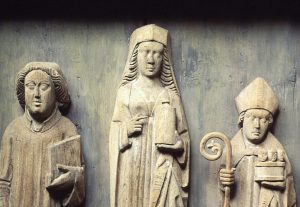CFP – Saints Online: Using digital methods to investigate the cults of saints
Postat den 4th September, 2019, 12:47 av Sara Ellis Nilsson
CFP International Congress on Medieval Studies, Kalamazoo 2020
Please consider applying for the following panel at the International Congress on Medieval Studies at Kalamazoo sponsored by the project Mapping Lived Religion: Medieval Cults of Saints in Sweden and Finland/Kartläggning av religion i vardagen, Linnéuniversitetet, and the Centre for Digital Humanities, Göteborgs universitet. Please send all paper proposals to sara.ellisnilsson@lnu.se. Submission guidelines can be found here: https://wmich.edu/medievalcongress/submissions
The deadline for paper abstracts is September 15, 2019.
Saints Online: Using digital methods to investigate the cults of saints
The source material for researching saints’ cults in the Middle Ages is large and varied, ranging from texts (e.g. hagiography, liturgical texts, diplomas, miracle collections, antiquarian accounts, etc.) to material evidence (e.g. relics, reliquaries, altars, chapels, buildings, images, pilgrim badges, votive objects), and popular tradition. Until now, grasping this immense source material in its entirety has been beyond the capacity of most researchers. However, developments within digital technology open up new possibilities for working with comprehensive sets of different data. The session welcomes papers on the employment of new technology for interdisciplinary research on the cults of saints. Papers that engage with digital methods in the study of the cults of saints are especially encouraged. These contributions may include presentations of completed projects, works-in-progress, or critical approaches to digital methods. The following are of particular interest: mapping (e.g. GIS), visualizations, textual analysis (text technologies), reconstructing books/manuscripts from fragments (especially liturgical), database creation and design for historical analysis, and interdisciplinary (digital) studies, as well as forms of knowledge organization (e.g. linked open data).
Det här inlägget postades den September 4th, 2019, 12:47 och fylls under Okategoriserade

